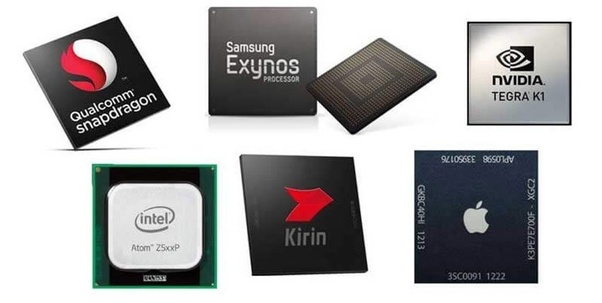Do you want to know the best performing processor for your mobile device? In this article; I have taken my time and research the Best Processors ranking for Mobile. Below is a detailed review of Best Processors for Mobile 2021
Most people do all kinds of resource-intensive tasks on their PCs. From photo editing to gaming and content creation, laptops and desktops have proved unbeatable in completing intensive tasks.
However, manufacturers of smartphones and other small mobile devices are trying to change this narrative. Equipping mobile phones with generous amounts of RAM with equally capable processors, mobile phones can do much more than they ever could.
If you want to use your smartphone for any intensive task, you have to go for the very best.

While most smartphones have sufficient memory and storage, most shoppers should focus on getting the phones with the best processors for mobile.
In this post, I’ll analyze some of the best mobile processors, so you can choose the very best for your use case, without digging a hole in your pocket.
Are you ready?
Best Processors for Mobile 2021
In the computing world, this will qualify as one of the most confusing topics. When shopping for a smartphone due to its processing power, you usually have to buy into the ecosystem.
For instance, you love Samsung Exynos SoCs. However, you only want a Google Pixel. There is no way you can get a Google Pixel with an Exynos SoC (yet).
Predictably, this list will be more or less a list of the most powerful smartphones over the past year. However, there are few exceptions, like the case of Snapdragon which powers numerous smartphones.
Enough of the talking, let’s get into the list of the best processors for mobile.
- Apple A14 Bionic
Apple’s products might be overpriced and all, but there is no doubt that they make some of the best quality products, at least in the processors’ department.
While they’ve gained immense popularity for their prowess in making processors for phones, their recent foray into the laptops and desktops market is nothing short of massive success.
The A14 Bionic chipset blows every other mobile chipset out of the water. It powers all of the smartphones in Apple’s current iPhone 12 lineup.
The processor is a hexa-core ARM processor with up to 3.1 GHz clock rate. It is supported by powerful integrated GPUs that keep gaming and general device usage smooth and iPhoney.
If you want the best of the best in mobile compute performance, there is no better processor than the A14 Bionic.
Sadly enough, this processor only accompanies the iPhone 12 lineup and the iPad Air. It’s either you get into Apple’s walled garden, or skip the best mobile processor; you choose.
- Qualcomm Snapdragon 888
Up until 2021 when Mediatek swept the market by surprise, Qualcomm was the top processor supplier for Android phone manufacturers.
This success is made possible for one major reason: they make the best mobile smartphone processors. The latest and greatest in the Snapdragon series is the Snapdragon 888, offering minor performance upgrades over the Snapdragon 865+ chipset.
The flagship Qualcomm mobile chipset is an octa-core processor, offering up to 3GHz clock speeds. Similar to the A14 Bionic, it is also an ARM-based processor with support for 5G.
However, unlike the A14 Bionic, the Snapdragon 888 isn’t locked to a specific smartphone brand. You get this processor on almost any high-end Android phone that you buy in 2021.
Notable smartphones sporting this processor include the Samsung Galaxy S21 lineup and the OnePlus 9 lineup. It is pretty disappointing that the Google Pixel devices don’t ship with this processor, preferring to go with some old Snapdragon processors instead.
If you need excellent performance from your phone without having to pay for an iPhone, the Snapdragon 888 is your next best bet.
- Exynos 2100
Samsung Galaxy S21 buyers from the United States get a special Snapdragon treatment, while customers from every other part of the world have to make do with an Exynos variant.
The latest from the Exynos lineup is the Exynos 2100. While it has improved a lot over its predecessors, it hasn’t improved enough to be listed above Snapdragon 888 while ranking the best processors for mobile.
In terms of design, Exynos 2100 is very similar to the competing Snapdragon 888. It also features eight CPU cores and an efficient integrated GPU.
In benchmarks, Exynos 2100 may seem to pull slightly ahead of Snapdragon’s flagship processor.
However, when you stress the CPU for an extended period, the Exynos starts to show its weaknesses. Exynos 2100 throttles badly under load to keep its cool, but Snapdragon processors don’t throttle nearly as bad.
Another downside of Exynos is its exclusivity to Samsung phones. If you don’t trust the Singaporean hardware manufacturer, you should just forget about Exynos, as you can’t get it on other phones.
If you fancy Samsung smartphones, you can go Exynos. Just make sure you take regular breaks from prolonged gaming sessions or you’ll experience some serious lags, sooner or later.
- Kirin 9000E
And now to our good old Chinese smartphone manufacturer — Huawei. Huawei makes processors for its smartphones too, and the best thing it has to offer at the moment is the Kirin 9000E.
Like most other flagship processors used in Android phones, the Kirin 9000E offers an octa-core setup, with the performance core offering up to 3.1GHz.
This processor is also ARM-based, and it uses a similar GPU as the Exynos 2100. It supports the latest 5G technology for ultrafast internet speeds and is equipped with Bluetooth 5.2.
Predictably, you’ll need to buy a Huawei device to get access to this processor. For now, the Kirin 9000E only appears in the Mate 40 series.
While Kirin CPUs historically don’t sell to third parties, we might see a change this year, as Huawei announced that they will be supplying the chips to third parties.
The change we anticipate might also roll over to next year as Huawei has recently decried that it’s gradually running out of chips for its smartphones. They obviously won’t sell when it’s barely enough for them, would they?
For now, you’ll need to get a Huawei smartphone to get your hands on Kirin 9000E. With the lack of Google Play services and the sketchy reputation of Chinese tech companies, I don’t think many people will want a Huawei smartphone.
- Mediatek Dimensity 1000 Plus
Mediatek recently usurped Qualcomm in the mobile CPU market. In 2020, Mediatek shipped more CPUs overall than Qualcomm, making them the number 1 mobile processor company on the market.
While Dimensity 1000 Plus isn’t an outstanding processor, it is the best processor you can get on a tight budget.
Exynos, Kirin, Snapdragon, and A14 Bionic chipsets all accompany very high-end phones. To get your hands on one of those, you must be ready to shell out $1,000, or more.
With Mediatek Dimensity 1000 Plus, you get a similar (but inferior) performance to the best in class, but you only pay a token.
Dimensity 1000 Plus is an octa-core CPU, like most others in this list. However, the highest core only maxes out at 2.6GHz, making it weaker than most other CPUs in this list.
It uses a similar GPU as Exynos 2100 and Kirin 9000E, and it’s also built on the ARM architecture.
If you want top-of-the-line performance, you’re better off with a chipset other than this. Compared to the older Snapdragon 865 chipset, Dimensity 1000 Plus struggles. Better to get an older Samsung than a newer phone with this chipset.
- Apple A13 Bionic
It might sound funny, but only a few processors perform better than the A13 Bionic in this list. This might sound quite alright until you learn that the A13 Bionic is a generation earlier than the A14.
While Snapdragon 888 will have no difficulties outperforming the A13 Bionic chipset, Exynos 2100 and Kirin 9000E will struggle, especially when put under heavy load.
Nobody anticipated this, given that the A13 Bionic is a full year older than most of these processors. Again, hats off to Apple; whoever leads their processor engineering team should keep it up.
The A13 Bionic is also a Hexa-core processor, just like its successor. It has two lightning and four thunder cores. The lightning cores reach speeds of 2.6GHz, while the thunder cores are more energy-efficient and max out 1.6GHz.
The A13 Bionic chipset accompanies the iPhone 11 lineup but misses 5G. if 5G doesn’t really matter to you, this still remains one of the best processors for mobile.
Only that you can only use it with iOS.
MORE ARTICLES
Bluestacks for iPhone (Bluestacks for iOS)
List Of Best 144Hz Gaming Laptop Under $1000
Super Mario Sunshine Rom For GameCube Free Download
Twitter Video Length Limit – How Long Can a Twitter Video Be?
Android Emulator for iOS (iOS Android Emulator, Android Emulator iPhone)
Animal Crossing Pocket Camp APK
Conclusion
Much has been said about mobile processors, and why they matter. Ultimately choosing the best one depends on your favorite brand, operating system, and use case.
If you’re OS-agnostic and you don’t mind spending money, Apple’s A14 Bionic is the processor of the moment.
However, if you need Android, you have a choice between Snapdragon 888, Exynos 2100 and Kirin 9000E. Go for the worse Mediatek Dimensity 1000 Plus if you’re on a tight budget.
Whatever processor you choose on here will do whatever you want, as they’ve been tried and confirmed as the best processors for mobile on the market in 2021.

